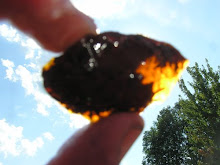
Bill Townsend says:
This column is a response to George Smith's recent column about the proposed Endangered Species Act listing for Atlantic salmon in the Penobscot, Kennebec and Androscoggin rivers (Sept. 24).
Atlantic salmon are a native species, so numerous when the first European settlers arrived in New England four centuries ago as to boggle their minds. Historical records show runs of hundreds of thousands of these fish in Maine's rivers.
Overfishing, pollution and dam construction without fish passage reduced this incredible resource to runs in a few rivers in Washington County by the middle of the 20th century.
The state of Maine recognized in 1947 that it would be unconscionable to allow the last remaining Atlantic salmon in the United States to join the passenger pigeon and the American bison in the ranks of once-great populations of wildlife destroyed by human greed.
In a poignant report, a special gubernatorial commission urged the state to take immediate action to protect Atlantic salmon.
The Legislature created the Atlantic Sea Run Salmon Commission in 1948, merged into the Department of Marine Resources as the Bureau of Sea Run Fisheries and Habitat in 2007. The agency has done yeoman work under the leadership of Horace Bond, Al Meister, Ed Baum and now Pat Keliher to protect Atlantic salmon in Maine.
In 1967, enactment of the federal Anadromous Fisheries Restoration Act led to the federal program to restore Atlantic salmon in much of its former habitat. The Penobscot River was chosen as the flagship for restoration.
That program continues today. The results have often been discouraging. Restoring a natural resource which has been destroyed is a difficult job.
But it is necessary, because how we treat the other species that share the planet with us is a measure of our humanity. Just like eagles and grizzly bears, we are restoring Atlantic salmon for their own sake, not merely to satisfy anglers.
Because they are born in fresh water, migrate to sea and return as adults to reproduce, the complex life cycle of Atlantic salmon makes them difficult to manage. In fresh water, dams, pollution and poaching take their toll. In the ocean, it has taken two decades of international negotiation to control commercial fishing of Atlantic salmon.
Yet bit by painful bit, there is progress. The plan to remove two dams on the Penobscot River is a case in point. No one should expect the legacy of centuries of environmental harm to be reversed overnight. But something worth doing must be done well, and doing it well takes time, energy and commitment.
There is real cause for hope. In 2008, returns of Atlantic salmon to the rivers of Maine, and around the North Atlantic, showed a significant increase over recent years. More than 2,000 fish returned to the Penobscot, more than double the average of the preceding five years. Whether this is the beginning of a trend, only time will tell. But despite the nay-sayers, short-term considerations cannot override the principles evoked in the 1947 report.
The Atlantic salmon is a species in deep trouble. Through the medium of the Endangered Species Act, the United States has established a mechanism for addressing the needs of species in trouble. The Act has been profoundly beneficial in its nearly 40 years of existence. In spite of the dire predictions made when Atlantic salmon were listed as endangered in Washington County, there has been no detriment to the economy of that region arising from the listing.
An Endangered Species Act listing of Atlantic salmon in the Penobscot, Kennebec and Androscoggin rivers will not bring the economic doom that George Smith has predicted. It will enable fishery managers to bring about the changes that are necessary for a healthy eco-system in which Atlantic salmon, other fish, birds, mammals and human beings alike can all thrive.
Clinton B. Townsend is a Skowhegan attorney and president of Maine Rivers. He was appointed by President George H.W. Bush as a U.S. commissioner to the North Atlantic Salmon Conservation Organization, where he served from 1990-94. He is vice chairman and secretary of the Atlantic Salmon Federation and a past president of the Maine Council of the Atlantic Salmon Federation.










No comments:
Post a Comment